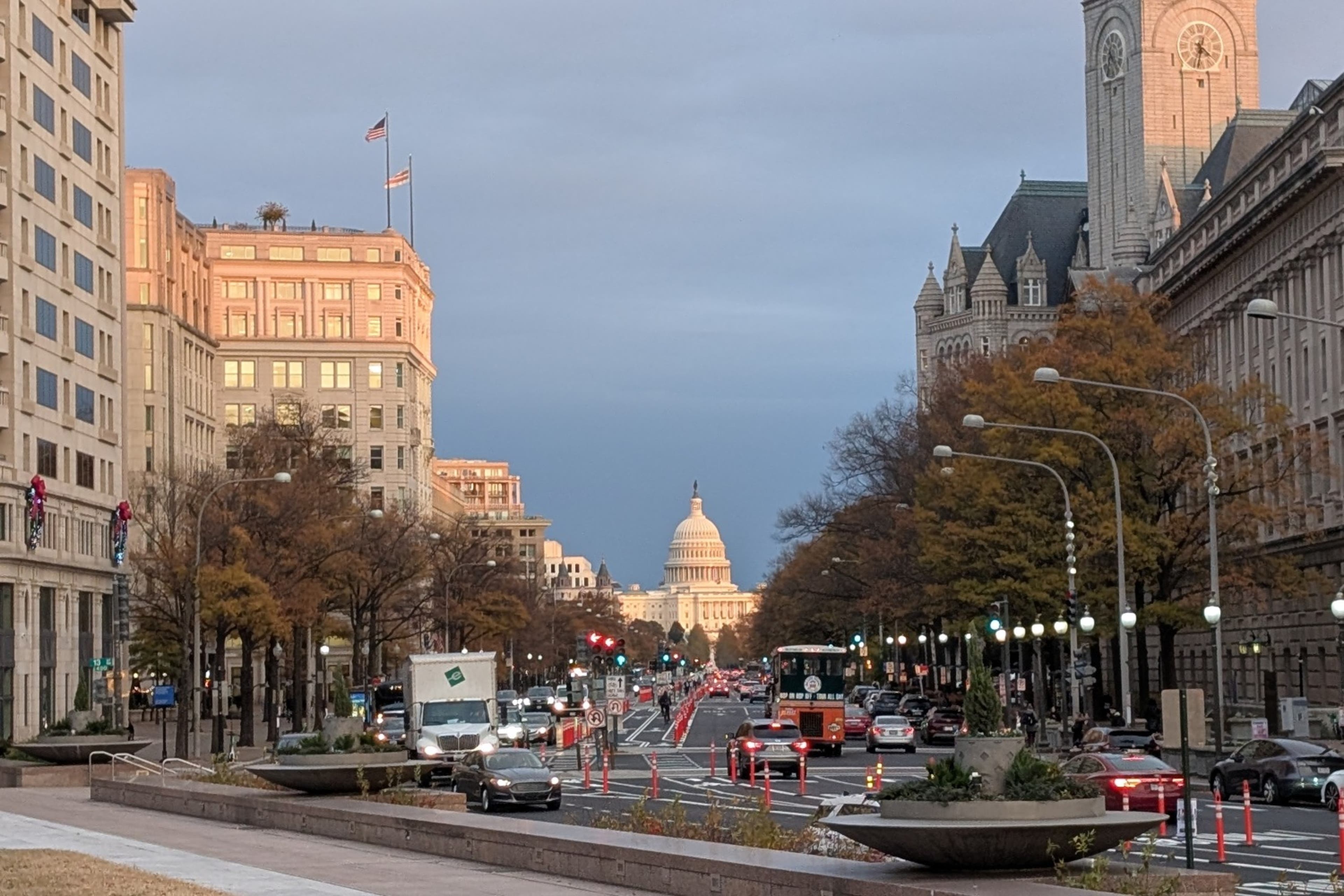A view from DC: The first few days of Trump’s AI and privacy agenda


Published:
Contributors:
Cobun Zweifel-Keegan
CIPP/US, CIPM
Managing Director, D.C.
IAPP
Even for privacy professionals, familiar as we are with the break-neck pace of new developments, the last week has been a whirlwind for U.S. policy. It seemed every hour brought fresh news, analysis, rumors or intrigue from the federal government.
And that doesn’t even count the major news out of New York this week, as both Democrat-controlled chambers of the state's legislature passed in record time a unique and potentially disruptive health privacy bill.
With so many new developments to track and unpack, I thought I'd do my best to use this space to bring it all together.
Never tired of winning
President Donald Trump began his second term nonconsecutive term 20 Jan. The first few days have been marked by a flurry of executive orders and other administrative actions across government laying the groundwork to achieve his policy goals.
Most of the actions were not surprising, but the speed, scope and strategy of the administration's approach to pursuing its objectives left the D.C. policy crowd racing to catch up. As staffing purges and the all-of-government assault on diversity, equity and inclusion initiatives crystalized, conversations across the capital often strayed toward reflections on McCarthyism or even the Cultural Revolution.
Whether such comparisons are justified, the revolutionary rhetoric was unavoidable: in the president's inaugural remarks promising a new American "Golden Age," in the plethora of lofty but short executive orders, or in the statements from agency leaders falling in line.
Promise kept: Rescinding Biden's AI executive order
As promised on the campaign trail, Trump used the first day of his presidency to rescind former President Joe Biden's Executive Order 14110 on the Safe, Secure, and Trustworthy Development and Use of Artificial Intelligence.
Though this initial action was a direct repeal of the prior executive order, it did not provide any clarification or interpretation about the intended effects of the rescission. Instead, the old order was packaged along with dozens of other orders for blunt revocation.
A few days later, a bit more clarity emerged when Trump signed the Executive Order on Removing Barriers to American Leadership in Artificial Intelligence, providing the first glimpse into the new administration's priorities for AI policy. Echoing the text of the Republican party platform, the executive order includes only a blunt sentence to distill the administration's entire approach to AI policy:
"Sec. 2. Policy. It is the policy of the United States to sustain and enhance America’s global AI dominance in order to promote human flourishing, economic competitiveness, and national security."
The phrase "human flourishing" is likely meant to convey more than its plain meaning would suggest. In the context of AI policy, the phrase is used most frequently by those subscribing to the theories of effective altruism and longtermism. That said, it is also used across academic circles, so its meaning could be up for debate. Notably, there is an entire program at Harvard focused on the study of human flourishing.
Overall, the executive order raises more questions than it answers. But it does answer one big question: What is the scope of the potential influence of rescinding the Biden AI order, after so much of its work has already been accomplished?
In short, everything is on the table.
The new order instructs agencies to review all programs and initiatives established under the Biden executive order, providing them with the political direction to adjust or reverse regulations if they are not in line with the one-sentence policy goal. Over the coming months, new agency leadership is instructed, "as appropriate and consistent with applicable law," to "suspend, revise, or rescind such actions, or propose suspending, revising, or rescinding such actions."
Many actions undertaken by the Biden order are noncontroversial and in keeping with the new policy goal, but the effects of this shift could still be wide ranging and dependent on the interpretations of new agency leaders.
The only regulations named directly in the new order are those promulgated by the Office of Management and Budget, which is instructed to revise — yet again — its rules governing the use of AI systems by the federal government. This will likely mean major changes to the AI governanceprocedures baked into OMB Memoranda M-24-10 and M-24-18.
More clarity will come in the coming months. By 22 July, White House policy staff must create an "action plan," in coordination with agencies, describing how they plan to achieve the policy goal. This almost certainly will include recommending a new AI executive order with some structural similarities to the Biden order, which itself built on an order from Trump's first term.
The White House staff tasked with building this action plan include the Assistant to the President for Science and Technology, Michael Kratsios, the Special Advisor for AI and Crypto, David Sacks, and National Security Advisor Michael Waltz.
Sacking the watchdogs
As reported by IAPP Staff Writer Alex LaCasse, the biggest privacy upset of the week was caused when President Trump sent letters to the three Democrat members of the Privacy and Civil Liberties Oversight Board, asking them to resign or be fired.
The New York Times reported on how the move could disrupt the functioning of this key independent oversight body of the intelligence community. The article also reviews the president's legal authority to fire PCLOB members, which appears to be somewhat stronger than in other independent bodies. In recent years, PCLOB members have sometimes disagreed across party lines on issues such as their approach to recommended reforms of Section 702 of the Foreign Intelligence Surveillance Act.
The news immediately sparked outrage from congressional leaders and civil society groups on both sides of the Atlantic, including the Center for Democracy and Technology and NOYB.
However, with few mechanisms to fight back, it is likely only a matter of time before all three members are fired, leaving the oversight body without a quorum until new members are installed.
Even the perception of weakening or coopting the PCLOB could cause disruption to the EU-U.S. Data Privacy Framework, though a European Commission spokesperson reminded reporters yesterday that the DPF agreements "remain applicable irrespective of the members of the PCLOB."
This is not the only disruption to oversight and advisory bodies. Across the federal government, independent advisory committees appear to have been dissolved. Such bodies exist for a variety of reasons and have differing levels of direct impact, but they generally consist of outside volunteer stakeholders who advise agencies on high-level policy.
One example which drew media attention was the dissolution of the Cyber Safety Review Board, an advisory committee of the Cybersecurity and Infrastructure Security Agency tasked with reviewing major cybersecurity incidents and proposing recommended solutions. Other DHS committees, including the Data Privacy and Integrity Advisory Board, were also immediately dissolved.
Political drama at independent agencies
At the U.S. Federal Trade Commission, Andrew Ferguson took the helm this week after his designation as FTC chair hours after Trump's inauguration.
Though Commissioner Lina Khan is no longer chair, she is not stepping down until the end of January, leaving the Democratic majority briefly in place at the agency. Though most major actions require majority approval, the chair does have power over routine agency actions, including staff, operations and opening or closing investigations.
Once Khan resigns, the FTC will be in a 2-2 split across party lines, meaning only bipartisan matters will move forward until a new Republican commissioner is confirmed. Trump nominated Mark Meador to the vacant seat.
Political divisions have already flared at the agency, after Chair Ferguson requested authority to implement Trump's anti-Diversity Equity and Inclusion directives. Consistent with the president's direction, the chair also immediately terminated the agency's Office of Workplace Inclusivity and Opportunity, placing those employees on administrative leave, along with its Diversity Council. The new chair of the Federal Communications Commission, Brendan Carr, took similar actions.
The vote to approve Ferguson's request drew a heated dissent from Commissioner Bedoya, who questioned why the chairman seemed eager to act on the DEI directive but had not yet announced any action to implement the President's Day 1 orders around reducing consumer prices. As Bedoya put it, "Chairman Ferguson could have done any number of things to actually lower the cost of living and create opportunities for American businesses and workers. He did none of them. Instead, he cancelled 'DEI.'"
FTC Commissioner Rebecca Kelly Slaughter also issued a statement, though along with Khan she did not participate in the vote, meaning the chairman was granted the authority he sought in a 2-1-2 vote. Slaughter's memo provides detailed legal analysis of the Chairman's existing authority and objects to the request for the "vague universe of 'any other action'" the chairman deems necessary to comply with the executive order. In a post, Bedoya referred to Slaughter's full memo as "required reading."
The Chairman issued his own statement joined by Commissioner Melissa Holyoak, replying primarily to Commissioner Bedoya's dissent, which he dismissed as "objecting to the outcome of the election."
On privacy issues, there remains some legal uncertainty about the fate of the Children's Online Privacy Protection Act Rule, the substance of which I analyzed in my column last week. Though it was unanimously approved, it was not published in the Federal Register before inauguration day, when Trump instructed agencies to hold on publishing final rules until they can be reviewed and approved by incoming agency heads.
Nevertheless, despite his lingering misgivings about the final rule, it seems unlikely Chairman Ferguson would move to pause or change its implementation after voting to approve it.
If the first few days of Trump 2.0 are any indication, the history-making changes are only beginning. There will be plenty more to unpack in the coming weeks.
Please send feedback, updates and recipes for human flourishing to cobun@iapp.org.
Cobun Zweifel-Keegan, CIPP/US, CIPM, is the managing director, Washington, D.C., for the IAPP.

This content is eligible for Continuing Professional Education credits. Please self-submit according to CPE policy guidelines.
Submit for CPEs


